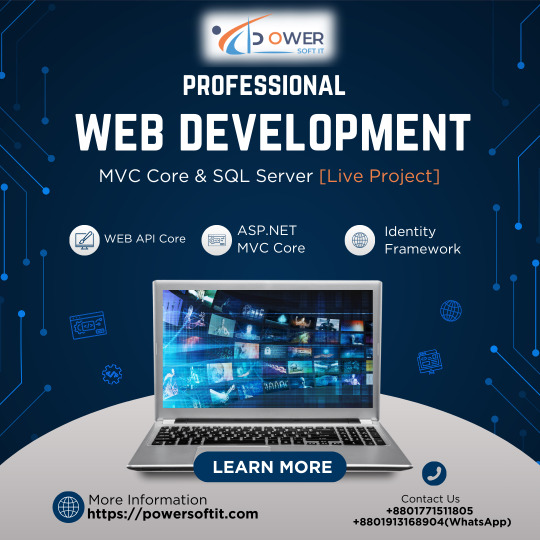Contact us: ☎ +880 1771511805 Or +880 1913168904(WhatsApp) 📧 [email protected] Or [email protected] 🌐︎ https://powersoftit.com/
Don't wanna be here? Send us removal request.
Text
Demystifying Programming Languages: A Guide for Beginners

Introduction:
In the dynamic realm of technology, the role of programming languages is fundamental. They serve as the bridge between human thought and machine execution, enabling us to create a wide array of applications, websites, and software solutions. For beginners stepping into the world of programming, the sheer variety of programming languages can be overwhelming. In this guide, we'll demystify programming languages, exploring their significance, differences, and providing insights for those embarking on their coding journey.
Understanding the Landscape:
The programming language landscape is vast and diverse, with each language designed for specific purposes. High-level languages like Python prioritize readability and ease of use, making them ideal for beginners. Java, with its "write once, run anywhere" mantra, is widely used for building robust, cross-platform applications. Meanwhile, languages like C++ and C# are powerful and efficient, often employed in systems programming and game development.
Choosing the Right Language: Selecting the right programming language depends on various factors, including the type of project, personal preferences, and career goals. For web development, languages like HTML, CSS, and JavaScript are essential. Python is a versatile language, suitable for web development, data analysis, and artificial intelligence. Aspiring game developers often turn to languages like UnityScript or C# for game development.
Learning Resources:
The abundance of learning resources can make the learning process enjoyable and accessible. Online platforms like Codecademy, Coursera, and freeCodeCamp offer interactive lessons for various programming languages. Books, coding bootcamps, and community forums are also invaluable resources for beginners seeking guidance and support.
Best Practices for Beginners:
For those starting their coding journey, it's essential to grasp the foundational concepts of programming, such as variables, loops, and functions. Practice through coding challenges and real-world projects enhances understanding and skill development. Embracing a growth mindset and seeking feedback from the programming community fosters continuous improvement.
Community Engagement:
The programming community is vast and welcoming, with forums like Stack Overflow and GitHub providing spaces for collaboration and knowledge-sharing. Engaging with the community not only offers solutions to coding challenges but also facilitates networking and exposure to diverse perspectives within the field.
The Evolving Landscape:
Programming languages are not static; they evolve to meet the demands of emerging technologies. Staying informed about industry trends and learning new languages can enhance one's versatility as a programmer. Continuous learning is a cornerstone of success in the fast-paced world of technology.
Conclusion:
Embarking on the journey of learning a programming language is a rewarding endeavor. By understanding the landscape, choosing the right language, utilizing available resources, practicing best coding practices, engaging with the community, and staying abreast of industry trends, beginners can navigate the programming world with confidence. As you embark on your coding journey, remember that every line of code is a step closer to turning your ideas into reality. Happy coding!
1 note
·
View note